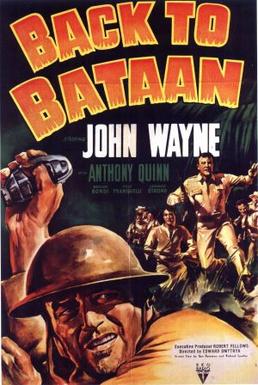
I’ve always wanted to play the part
of that puckish pubescent Filipino boy
in those John Wayne Pacific-War movies.
Pepe, Jose, or Juanito would be smiling,
bare-chested and eager to please
for most of the steamy jungle scenes.
I’d be the one who would cross
the Japanese lines and ask for tanks,
air support, or more men. I’d miraculously
make it back to the town where John Wayne
is holding his position against the enemy
with his Thompson machine-gun. As a reward,
he’d rub that big white hand on my head
and he’d promise to let me clean
his Tommy gun by the end of the night. But
then, a Betty Grable look-a-like love
interest would divert him by sobbing
into his shoulder, saying how awfully scared
she is about what the “Japs” would do
to her if she were captured. In one swift
motion, John Wayne would sweep her off
her feet to calm her fears inside his private quarters.
Because of my Hollywood ability
to be anywhere, I’d be under the bed
watching the woman roll down her stockings
as my American hero unbuckles his belt
I’d feel the bottom of the bed bounce off my chest
as small-arms fire explodes outside the walls.
First published in El Grupo McDonald’s (Tia Chucha, 1995). Reprinted by permission on Nick Carbó.
Nick Carbó has edited two anthologies of Filipino literature, Returning a Borrowed Tongue: An Anthology of Filipino and Filipino American Poetry (1995) and Babaylan: An Anthology of Filipina and Filipina American Writers (2000), and coedited the anthology Sweet Jesus: Poems About the Ultimate Icon (2002) with Denise Duhamel. His honors and awards include fellowships from the National Endowment for the Arts and the New York Foundation for the Arts and residencies from the MacDowell Colony, Yaddo, Fundacion Valparaiso, and Le Château de Lavigny. His collections of poetry include El Grupo McDonald’s (1995); Secret Asian Man (2000), which won an Asian American Literary Award; and Andalusian Dawn (2004). Carbó’s work can be humorous, even satirical, in his examinations of American pop culture and its influence on Asian countries such as the Philippines. He told National Public Radio, “By writing about these influences, it’s my way of kicking back.”








